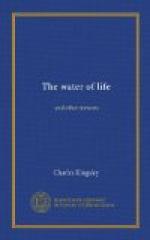SERMON VIII. FREE GRACE (Preached before the Queen at Windsor, March 12, 1865.)
Isaiah iv. 1.
Ho, every one that thirsteth, come ye to the waters, and he that hath no money; come ye, buy, and eat; yea, come, buy wine and milk without money and without price.
Every one who knows his Bible as he should, knows well this noble chapter. It seems to be one of the separate poems or hymns of which the Book of Isaiah is composed. It is certainly one of the most beautiful of them, and also one of the deepest. So beautiful is it, that the good men of old who translated the Bible into English, could not help catching the spirit of the words as they went on with their work, and making the chapter almost a hymn in English, as it is a hymn in Hebrew. Even the very sound of the words, as we listen to them, is a song in itself; and there is perhaps no more perfect piece of writing in the English language, than the greater part of this chapter.
This may not seem a very important matter; and yet those good men of old must have felt that there was something in this chapter which went home especially to their hearts, and would go home to the hearts of us for whose sake they translated it.
And those good men judged rightly. The care which they bestowed on Isaiah’s words has not been in vain. The noble sound of the text has caught many a man’s ears, in order that the noble meaning of the text might touch his heart, and bring him back again to God, to seek Him while He may be found, and call on Him while He is near; that so the wicked might forsake his way, and the unrighteous man his thoughts, and return to God, for He will have compassion, and to our God, for He will abundantly pardon; and that he might find that God’s thoughts are not as man’s thoughts, nor His ways as man’s ways, saith the Lord; for as the heavens are higher than the earth, so are His ways and thoughts higher than ours.
Yes—I believe that the beauty of this chapter has made many a man listen to it, who had perhaps never cared to listen to any good before; and learn a precious lesson from it, which he could learn nowhere save in the Bible.
For this text is one of those which have been called the Evangelical Prophecies, in which the prophet rises far above Moses’ old law, and the letter of it, which, as St. Paul says, is a letter which killeth; and the spirit of it, which is a spirit which, as St. Paul says, gendereth to bondage and slavish dread of God: an utterance in which the prophet sees by faith the Lord Jesus Christ and His free grace revealed—dimly, of course, and in a figure—but still revealed by the Spirit of God, who spake by the prophets. As St. Paul says, Moses’ law made nothing perfect, and therefore had to be disannulled for its unprofitableness and weakness, and a better hope brought in, by which we draw near to God. And here, in this text, we see the better hope coming in, and as it were dawning upon men—the dawn of the Sun of Righteousness, Jesus Christ our Lord, who was to rise afterwards, to be a light to lighten the Gentiles, and the glory of His people Israel.




